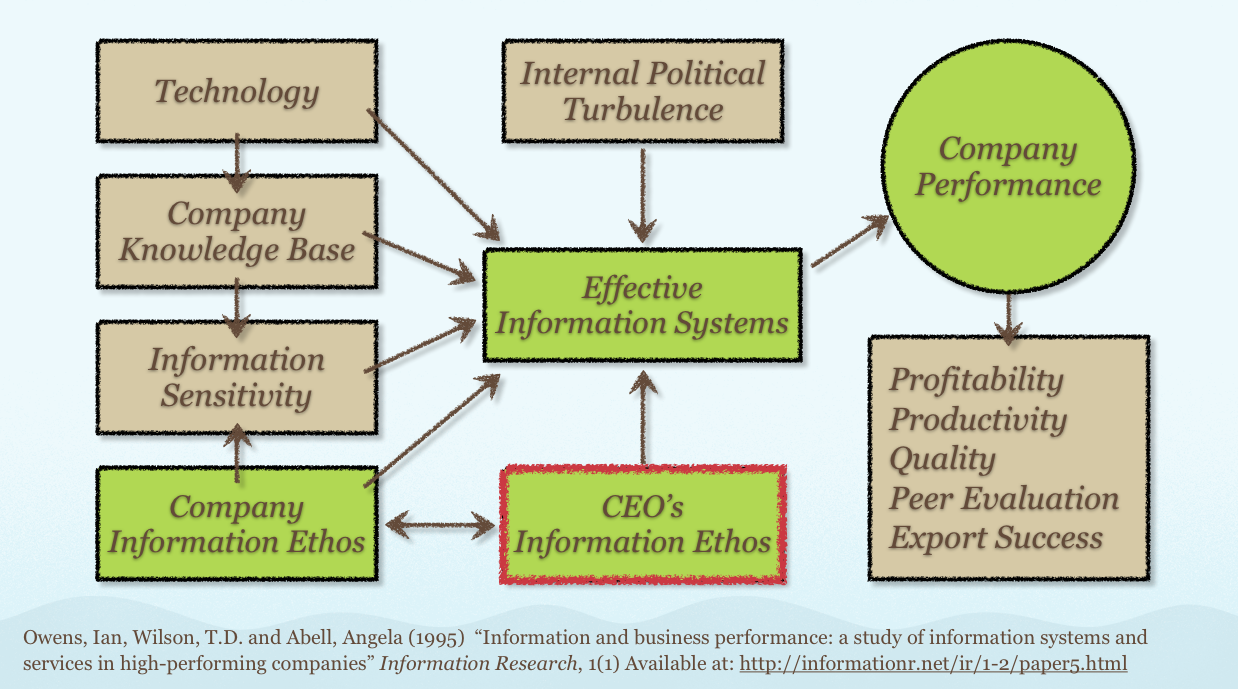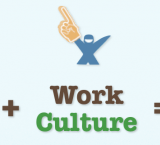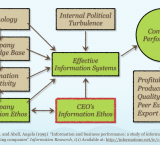Story:
It's the Culture, Stupid! How Atlassian maintains an open Information Culture.
In his Management 2.0 challenge, Gary Hamel claims that blogs and wikis haven't changed the way in which organizations are managed and led. This may be the general case, but fortunately there are some companies in which such information tools have successfully changed the way companies are run.

"Culture and quality in information services are positively related to performance."
— Lars Höglund, A Case Study of Information Culture and Organizational Climates (1998)
University of Borås. Swedish School of Library and Information Science
“Information culture is a strategic goal and should be planned for as much as the transformation of physical resources.”
— Ginman, Information Culture and Business Performance (1988)
International Association of Technological University Libraries (IATUL) Quarterly
“Effective information management is how people use information, not machines.”
— Thomas H. Davenport, Saving IT’s Soul: Human-Centered Information Management (1994)
Harvard Business Review, March-April 1994

Thus, any company seeking to improve its management of information should first examine its own corporate culture.
1. Core Value: "Open Company, No Bullshit"
| Internal Shared Information | External Public Information |
|
Business plans |
Pricing |
- Instead of sending person-to-person emails, relevant information is placed on the wiki for all staff to read
- Instead of storing information in documents (eg Word files), information is entered directly onto the wiki so that it is searchable and accessible to all staff — even from home!
- New staff members, upon joining the company, have immediate access to all historical information kept on the wiki
This practice has been codified into the company value of "Open Company, No Bullshit". This is not a corporate edict — the value was documented by staff as describing the actual company culture at Atlassian.
2. Online Collaboration
- Contributing ideas to project plans
- Critiquing information on the wiki (which often leads to lively online debate!)
- Linking to other related information, either elsewhere on the wiki or out to the Internet
- Arguing the merits of HR sick leave policies that require medical certificates
- Generally interacting with other staff, even if they are in a remote office or working from home
3. Reading the corporate news
- Replacing 'all-hands' emails: Important information is placed on the wiki rather than in emails, which means there is a permanent, accessible historical record rather than having information stored in personal email in-boxes
- Giving an 'overview' of pages and comments: Staff aren't expected to read every page and every comment on the wiki. The news feed provides a quick list of these topics, enabling staff to pick and choose what they wish to read. They can even see 'hot topics' that generate lots of comments and then join the discussion.
- Allowing staff to monitor the company as a whole: Emails and distribution lists usually target a small set of people. In contrast, the news feed allows staff to 'monitor' the whole company, remaining aware of news, discussions and hot topics in other departments and other office locations.
4. Internal Blogging
- A programming conundrum or a tidbit of information
- A report on a recent customer visit
- A request for advice on holiday destinations
- A proposal to shake-up the way the company sells its products
- A pointer to an interesting article on the Internet
Many companies provide "bulletin board"-type systems to their employees for non-work topics, but such systems are infrequently used. However, by combining this 'personal' information exchange with the general flow of corporate knowledge, Atlassian has produced an open information exchange that is highly visible and frequently referenced by all staff. Sitting at one's desk can be the easiest way to share information.
- Product pricing is totally public, including discount policies
- Prospective customers can download our software and try it free for 30 days
- All documentation is public and available for anyone to access
- Bug reports and feature requests are public, allowing people to 'vote' on their preferred features
Challenge 1: Instilling the practices
Challenge 2: Learning the new medium
Challenge 3: Too much information
- Online collaboration to share ideas around a topic
- Historical information accessible to all staff, including new-starters
- A central repository of information without the need to send documents, compare versions and distribute updates
- Easy information searching as all information is kept in one system
- An open information culture that encourages staff to share information
Lead by example
- Log in to post comments
- Log in to post comments
Brilliant story John! Beautifully presented.
Having joined Atlassian myself - a year ago - the amazing 'Open Information Culture' I experienced was awesome! It was such an inspiring change from the 'closed corporate culture' I had experienced earlier at Investment Banks and large Corporates. Atlassian is the perfect environment that fosters creativity and motivates everyone who works there "to be the change they seek". I could not agree more to all that John has said.
- Log in to post comments
- Log in to post comments
Great case study, though I'd suggest modern businesses run on relationships even more than they do on information - further emphasising the importance of culture of course.
- Log in to post comments
John, I love this story -- very detailed and it shows how something pretty incredible (a very open company) can be facilitated with some relatively simple tools (that are mostly available from third-party cloud vendors now). Point taken that the tools won't do it alone without the commitment from top management and corresponding buy-in by those who join the team. Thanks for taking the time to lay out the details.
- Dave
PS. I also love the fact that you appear to be proudly showing off a PowerBook 145B in your profile pic. You still carrying that around, or is that an old pic?
- Log in to post comments
- Log in to post comments









You need to register in order to submit a comment.